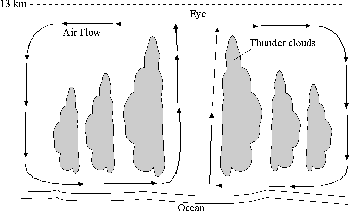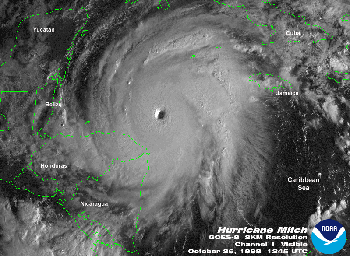Education Links
Leaving Cert
 Maths
Maths
 French
French
 English
English
 Chemistry
Chemistry
 Physics
Physics
 Biology
Biology
 Economics
Economics
 Spanish
Spanish
 Geography
Geography
 History
History
Junior Cert
In October 1998 Hurricane Mitch resulted in the deaths of over 10,000 people in Central America. It was the deadliest Atlantic hurricane in 200 years.
1. Structure
Hurricanes are tropical storms with sustained winds of over 74 mph. A mature hurricane is a very simple system with very distinctive features (see cross-section below):
- A cellular circulation system
- Air spirals toward the centre near the surface
- A central eye where there is little cloud
- Air rises near close to the eye forming a cloud 'wall'
- At the top air pours out of the hurricane

You can see the evidence of this motion in the satellite picture of hurricane Mitch. The dark hole in the centre is the 'eye' and the swirling mass of cloud is the 'top' of the hurricane.
2. Hurricane Facts
- Called hurricanes in the Atlantic and typhoons in the Pacific.
- They form in the tropics over warm ocean water (see the map).
- They move from east to west. Atlantic Hurricanes begin life as small storms off the African coast that develop into hurricanes near the Caribbean.
- They form in Autumn months only. The Atlantic hurricane seasons lasts from September to November.
- They lose strength and decay over land.


